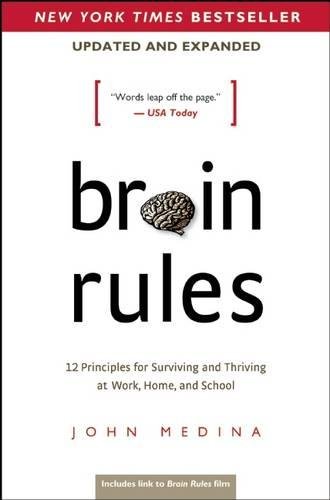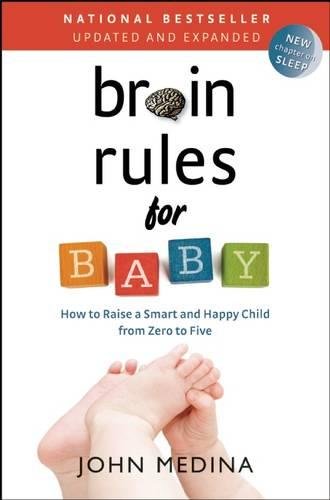When you first discover that a leading brain expert says these three parenting strategies are best for your child’s development, it’s time to stand up and listen.
When I had kids, parenting became an immediate passion. My experience brought immediate challenges. It all wasn’t quite what I imagined. What grew out of that was a determination to do it well.
I’ve fallen short of that mark over and over, but I keep pressing on. One of my better parenting qualities is to be a student of the trade.

Reading books, talking to more experienced parents as well as doctors and professionals that work with children has been part of the journey. One of my favorite mom reads was “Brain Rules for Babies” by John Medina. He is also the author of “Brain Rules.”
In doing this post, I just realized he has other books on the market that I definitely need to purchase…especially the aging well one. I’ll share them all with you now.
Brain Rules (Updated and Expanded): 12 Principles for Surviving and Thriving at Work, Home, and SchoolBrain Rules for Baby (Updated and Expanded): How to Raise a Smart and Happy Child from Zero to FiveBrain Rules for Aging Well: 10 Principles for Staying Vital, Happy, and SharpBrain Rules: 12 Principles for Surviving and Thriving at Work, Home, and School
After acquiring “Brain Rules for Babies,” I also discovered that he was my husband’s college mentor when he was at University of Washington. How crazy is that?!
I am not being paid for this post, but since I am constantly mentally coming back to and trying to implement the things I learned in that book years ago, I want to share with you three parenting strategies that stand out to me.
Leading Brain Expert Says These Three Parenting Strategies Are Best for Your Child’s Development
While the book is jammed with great information, I wanted to highlight three parenting goals that I try and work on constantly.
Parent with Empathy
Empathy is an extremely important skill for your kids to develop. Medina say empathy is one of the top two predictors of social competency.
Being socially competent helps kids develop relationships and be successful in our world. Medina says relationships are one of the leading contributors to happiness.
Read more about parenting with empathy here.
My natural go-to as a mom is a combination of frustration and buck-up. Some of my kids might happen to run on the dramatic side so I try to temper that.
I have found, however, when I take a moment to empathize first, their response and turn-around time is closer to what I would hope. Read my post, “Today I Cried with my Child” for a personal testimony.

If a child comes to you with great frustration and drama that her sibling has taken a toy from her, a wonderful empathetic response would be, “That would be really frustrating. You must feel angry about that. Is that right?”
From there you can do a short lesson on how to respond to anger or how to best deal with the situation. You can, outside of the emotional moment, teach these lessons on patience from my character development series.
The whole point of this, however, is to first respond with empathy, describing the emotions the child feels and then acknowledging and relating to their feelings.
As you work on patience and empathy yourself (lessons I’m constantly learning), it’s important to remind yourself that your child might not have the words or tools to deal with their own emotions.
John Medina says children’s bodies “can feel fear, disgust, and joy way before their brains can talk about them. This means that children will experience the physiological characteristics of emotional responses before they know what those responses are. That’s why large feelings are often scary for little people; tantrums often self-feed because of fear.”
Therefore, having empathy and helping children identify emotions is key as you are raising your little ones. It doesn’t mean we continue to allow tantrums, but it means we parent through them. More about that here.
Parent with an Authoritative Parenting Style
Let me first clarify that an authoritative parenting style isn’t the same as an authoritarian parenting style.
Authoritative parenting has high expectations, but it also has high responsiveness and much warmth. It emphasizes the importance of both having a strong relationship with your child but also boundaries and standards.
Authoritarian, in contrast, does have the rules set in place, but has more of a “do as I say because I say so” mentality without a strong emotional bond.

This chart will help you understand the different parenting strategies. You want your parenting to fall into the upper left corner of this diagram.
This post on the heart behind teaching kids to obey should help dissect it more for you.
Parent with Praise…But Here’s How
We want to praise our kids, but did you know that not all praise is equal?
Having a positive approach to parenting with lots of compliments is wonderful. Finding the good is great. Asking for the behaviors we want is better than emphasizing the behaviors we don’t want.

Praise, praise, praise while you also teach and correct.
The goal, however, is to praise effort more than ability.
According to Medina, “Kids regularly praised for effort successfully complete 50-60% more hard math problems than kids praised for intelligence”
If you praise their innate ability rather than their effort, three things happen:
- They see their mistakes as failures due to lack of ability.
- The child becomes more concerned with how they appear on the outside rather than actually learning something.
- They are less willing to make efforts because there is too much at stake if they fail.
Therefore, this is what your compliments should look like:
- “You really worked hard to get that A.” vs. “You are so smart.”
- “I love how dedicated you were to rehearsing that piano piece.” vs. “You are so talented.”
- “I am really proud of your commitment to your team and efforts you are making at basketball. Those shots you made really show your efforts.” vs. “You are so athletic.”
Parenting with the Best Strategies in Mind

Parenting is no joke. It is not for the faith of heart. Hard work, knowledge and humbleness as a parent are all part of the equation.
You are here, however, because you care. Like me, you want to do your job well and will keep pursuing it for your family.
Looking for More Parenting Ideas?

One Parenting Phrase That Helps You Get the Response You Want

The Day I Had to Tomato Stake My Children










